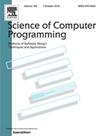自适应弱硬实时混合临界系统的精确和充分的可调度性测试
IF 1.4
4区 计算机科学
Q3 COMPUTER SCIENCE, SOFTWARE ENGINEERING
引用次数: 0
摘要
本文提出了具有弱硬约束(AMC-WH)的自适应混合临界系统的增强可调度性分析技术,当系统切换到高临界(HI)模式时,低临界(LO)任务作业可以继续执行。先前的AMC-WH研究通常采用跳过模型,在不违反系统约束的情况下,可能会错过m个连续LO任务截止日期中的5个。这些方法在固定作业执行模式下评估LO任务的最坏情况响应时间(WCRT)。相比之下,这项工作引入了一种基于更一般的(m,k)公司模型的新颖可调度性分析框架,其中每个LO任务必须满足任意k个连续截止日期中的至少m个。此扩展允许在模式转换后为LO任务提供更灵活和可配置的执行模式,从而提高系统对不同操作条件的适应性。此外,我们提出了一种基于响应时间分析(RTA)的精确可调度性测试,该测试结合了(m,k) firm模型,通过动态管理LO任务执行模式后模式切换来精确分析可调度性。综合实验评价证实了所提测试的有效性和实用性。特别是,与AMC-WH跳过基线相比,我们的方法在可调度性方面提高了18%,同时还优化了资源利用率。通过利用(m,k)-firm模型的灵活性,我们的方法支持广泛的实时应用程序,具有对截止日期错过的不同容忍度,增强了LO任务执行策略的适应性。本文章由计算机程序翻译,如有差异,请以英文原文为准。
Exact and sufficient schedulability tests for adaptive weakly-hard real-time mixed-criticality systems
This paper presents enhanced schedulability analysis techniques for Adaptive Mixed-Criticality systems with Weakly-Hard constraints (AMC-WH), where the low-criticality (LO) task jobs can continue to execute when the system switches to high-criticality (HI) mode. Prior AMC-WH studies typically adopt the skip-over model, in which up to s out of m consecutive LO task deadlines may be missed without violating system constraints. These approaches evaluate the Worst-Case Response Times (WCRT) of LO tasks under a fixed job execution pattern. In contrast, this work introduces a novel schedulability analysis framework based on the more general -firm model, where each LO task must meet at least m out of any k consecutive deadlines. This extension allows for more flexible and configurable execution patterns for LO tasks after a mode transition, improving the adaptability of the system to varying operational conditions. Additionally, we propose an exact schedulability test for AMC-WH based on Response Time Analysis (RTA), which incorporates the -firm model to precisely analyze schedulability by dynamically managing LO task execution patterns post-mode switch. Comprehensive experimental evaluations confirm the effectiveness and practicality of the proposed tests. In particular, our approach achieves an 18% improvement in schedulability compared to the AMC-WH skip-over baseline, while also optimizing resource utilization. By leveraging the flexibility of the -firm model, our method supports a wide range of real-time applications with diverse tolerance levels for deadline misses, offering enhanced adaptability in LO task execution strategies.
求助全文
通过发布文献求助,成功后即可免费获取论文全文。
去求助
来源期刊

Science of Computer Programming
工程技术-计算机:软件工程
CiteScore
3.80
自引率
0.00%
发文量
76
审稿时长
67 days
期刊介绍:
Science of Computer Programming is dedicated to the distribution of research results in the areas of software systems development, use and maintenance, including the software aspects of hardware design.
The journal has a wide scope ranging from the many facets of methodological foundations to the details of technical issues andthe aspects of industrial practice.
The subjects of interest to SCP cover the entire spectrum of methods for the entire life cycle of software systems, including
• Requirements, specification, design, validation, verification, coding, testing, maintenance, metrics and renovation of software;
• Design, implementation and evaluation of programming languages;
• Programming environments, development tools, visualisation and animation;
• Management of the development process;
• Human factors in software, software for social interaction, software for social computing;
• Cyber physical systems, and software for the interaction between the physical and the machine;
• Software aspects of infrastructure services, system administration, and network management.
 求助内容:
求助内容: 应助结果提醒方式:
应助结果提醒方式:


